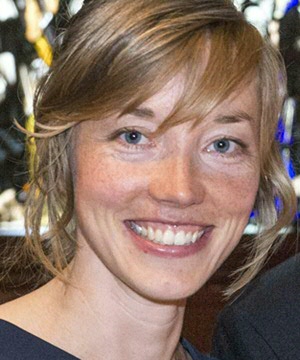Gaining a better understanding of depression

Hanna van Loo is one of the new members that will be installed into the UG's Young Academy Groningen. She is doing research into depression. Patients with depression present a wide variety of symptoms and course of illness. Van Loo is researching the best way to understand and treat depression. She is using new data mining techniques to determine which subtypes of depression predict a more severe progression of the illness. In her current research project, she is focusing in particular on the interaction between genes and environments in the familial transmission of depression.
Can you tell us a little more about your current research?
We still know little about the causes of depression, despite the fact that it is very common. Roughly 15% of the Dutch population is affected by it at some point in their lifetime. Genes play a key role in this, but so do stressful events and personality factors. And the causes behind the onset of depression may differ from one patient to another. All these differences make it difficult for a patient to find a treatment that is right for them.
Is there an aspect of your research that stands out in particular?
I am really pleased with the collaboration that I have forged with one of the best research groups in psychiatry, the Virginia Institute of Psychiatric and Behavioral Genetics in Virginia, USA. My research is very multidisciplinary and international, through which you can achieve more by working together than on your own. It is hugely inspiring to work with such excellent scientists and to contribute as a team to our understanding of psychiatric disorders. But it is also a challenge, mainly because you can’t just pop in and see each other.
You studied medicine and philosophy. How has philosophy benefited you?
Philosophy has given me a lot; it’s difficult to sum it all up in just one sentence. For example, it trained me to think clearly about what exactly is the key question, about the value of definitions such as depression, about how we can increase our knowledge and what counts as evidence. In addition to my empirical research in psychiatry, I am also fascinated by the philosophy of science. For years, I have been working alongside Jan-Willem Romeijn, Professor of Philosophy of Science at the UG. We use knowledge from the philosophy of science to answer questions in psychiatry. This has really helped my research into depression.
Why did you want to become a member of YAG?
The YAG is an enthusiastic club of young researchers with all kinds of different backgrounds and nationalities. I thought it would be very inspiring to be a part of that. I also think it’s important to think about how we can improve the University, for example, the working conditions for young researchers, diversity at the University, communication with a wider audience. These are the YAG’s main goals, and I hope to be able to contribute towards achieving them.
Your work is very interdisciplinary. What do you expect from being a YAG member in this respect?
I have already spoken to a few members about the overlap between our areas of expertise. For example, Ward Rauws explained how you can look at the city as a complex, ever-changing system, in which all kinds of parts are interconnected. To some extent, this complexity, the dynamics and the interactions also apply to people with depression. And Tina Kretschmer, for example, is investigating the relationship between events in childhood and psychiatric disorders later in life, which is also relevant to my research. So, I expect to be able to be part of a number of multidisciplinary collaborations in the coming years.
Can you give an example?
Every day, I learn new things from colleagues, students and patients, so in that sense I have a lot of examples. One of my main examples is Ken Kendler, psychiatrist and scientist, with whom I worked in the US for a year as a postdoc, and with whom I am still collaborating intensively. He has a tremendous amount of knowledge, is an excellent researcher and is an example of how, as a psychiatrist, you can bridge the gap between clinical practice and research. And we both have an enthusiasm for science.
- Watch the video on Van Loo's research
More news
-
17 November 2025
Artificial intelligence in healthcare
-
04 November 2025
AI Factory in Groningen advances digital sovereignty
-
03 November 2025
Menopause in perspective: How the media influences our perception
